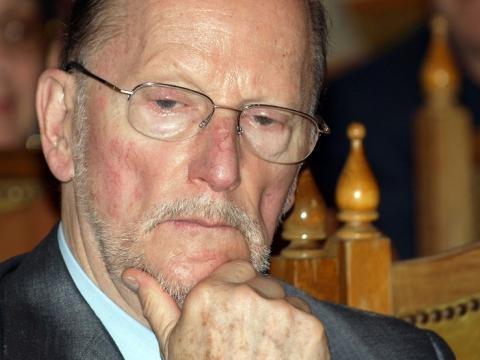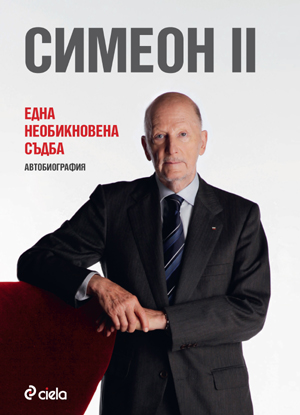The long-waited autobiographical book by Simeon Saxe-Coburg-Gotha has already been released on the market. Tsar of the Bulgarians during his childhood (1943-1946), he spent decades in exile before becoming Prime Minister of Bulgaria in the period 2001-2005. The book is entitled “The extraordinary life story of a Tsar” and reveals little-known or completely unknown facts from his life.
 “These are not extensive memoirs and the book is more of a review of a life. Or as my daughter Kalina put it – a review of the meaning of a life,” Simeon Saxe-Coburg-Gotha said during the presentation of his book. “This was one of my goals because of the number of myths that have constantly been in circulation around me. It is a different thing when one talks in the first person and I wanted to leave something for history; to describe a period that has often been neglected or even erased from memory for different reasons.”
“These are not extensive memoirs and the book is more of a review of a life. Or as my daughter Kalina put it – a review of the meaning of a life,” Simeon Saxe-Coburg-Gotha said during the presentation of his book. “This was one of my goals because of the number of myths that have constantly been in circulation around me. It is a different thing when one talks in the first person and I wanted to leave something for history; to describe a period that has often been neglected or even erased from memory for different reasons.”
"Talking about oneself is always difficult, and even more so when upbringing and environment are an obstacle to this, as is the case in royal families" - says Simeon II. His fate is truly extraordinary because of a number of factors. He is the first monarch in history who, after 50 years of exile, returned to Bulgaria to become Prime Minister. During his term of office Bulgaria managed to become a member of NATO. "I pursued a policy of reconciliation out of necessity,” he says. The truth is that many people expected him to take his revenge on people from the former communist regime because of what they had done to him and his family, but he never did. When presenting the book, former MEP from the National Movement Simeon the Second - Stanimir Ilchev summarized some of the reasons why the book was written:
 "I think we can talk of three sets of reasons. The first is connected with history and Simeon Saxe-Coburg-Gotha's attitude to it. The book highlights important elements like duty to the state and family. The second group of reasons is the wish to leave for posterity his unique administrative and business-oriented know-how, as well as his life experience, as during the 50 years of exile Simeon Saxe-Coburg-Gotha's life was not a string of days filled with contemplation. Simeon II has been part of big business and has established contacts with some outstanding people. He has played the discrete function of mediator in difficult situations. So, one of the reasons to write such a book is to share this experience. The third reason is that Simeon II is totally at variance with a group of people whom he calls revisionists - people who wait for all participants in a given events to pass away in order to start distorting history and slinging mud."
"I think we can talk of three sets of reasons. The first is connected with history and Simeon Saxe-Coburg-Gotha's attitude to it. The book highlights important elements like duty to the state and family. The second group of reasons is the wish to leave for posterity his unique administrative and business-oriented know-how, as well as his life experience, as during the 50 years of exile Simeon Saxe-Coburg-Gotha's life was not a string of days filled with contemplation. Simeon II has been part of big business and has established contacts with some outstanding people. He has played the discrete function of mediator in difficult situations. So, one of the reasons to write such a book is to share this experience. The third reason is that Simeon II is totally at variance with a group of people whom he calls revisionists - people who wait for all participants in a given events to pass away in order to start distorting history and slinging mud."
Simeon Saxe-Coburg-Gotha expressed the hope that Bulgarians would still find a national cause that could unite them, as they did in 2007 when Bulgaria joined the EU.
English: Alexander Markov
Volunteers joined the efforts to clean and restore the monastery St. Spas near Bakadzhik peak. The campaign is being organized on 2 November by Stoimen Petrov, mayor of the nearby village of Chargan, the Bulgarian news agency BTA reports. The..
There are three special days on the calendar of the Bulgarian Orthodox church, on which believers pray to God and give alms to honour the memory of their dear departed. The three All Souls’ Days always fall on the Saturdays before Meat..
One frosty November morning in 1917, as World War I was raging, a Zeppelin L 59 took off from the air base near Yambol bound for Tanzania. The purpose of the flight was to deliver ammunition and materials to the German military units in a remote..
105 years ago, on November 27, 1919, a treaty was signed in the Parisian suburb of Neuilly-sur-Seine, officially ending Bulgaria's..

+359 2 9336 661
